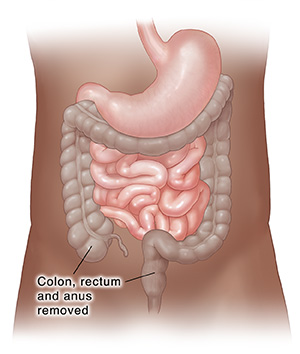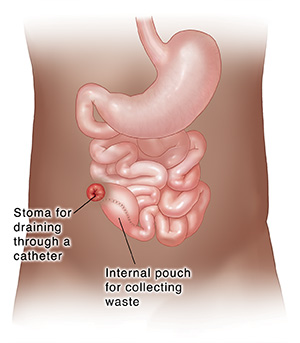This surgery is done to treat diseases of the digestive tract. It removes all of your large intestine. When healed, waste passes from your small intestine through an opening (stoma) in your belly (abdominal) wall and into a pouch outside of your body. This surgery may be done either with open surgery or laparoscopic surgery:
-
Open surgery. This is a traditional surgery. It's done through a large cut (incision) in your abdomen.
-
Laparoscopic surgery. This is a minimally invasive surgery. It's done through small cuts.
Your healthcare provider can talk with you about the option that's best for you.
Getting ready for surgery
Follow any instructions about getting ready from your healthcare provider. You may need to start getting ready a few weeks before surgery. You may have to do the following:
-
If you smoke, try to quit. Ask your medical team for help. Smoking decreases the amount of oxygen in your blood, which is critical to wound healing. Smokers have 4 times the risk of tissue damage at the incision site than nonsmokers. Smoking decreases your ability to fight infections and increases your risk of pneumonia and other breathing problems. It also increases your blood pressure and heart rate. Stopping at least 1 day before your operation can help reduce your blood pressure and irregular heartbeats.
-
Tell your provider about any medicines you're taking. You may need to stop taking all or some of these before your surgery:
-
Prescription medicines
-
Over-the-counter medicines for pain and fever, such as aspirin, and nonsteroidal anti-inflammatory drugs (NSAIDs), such as ibuprofen
-
Blood-thinning medicines (anticoagulants)
-
Illegal drugs
-
Herbs, vitamins, minerals, and other supplements
-
-
If you drink alcohol, tell your provider how much. This is very important if you're a heavy drinker. Alcohol withdrawal can be life-threatening. So be honest with your healthcare provider.
-
If you'll have a stoma, you'll meet with an enterostomal therapy (ET) nurse or a wound, ostomy, and continence (WOC) nurse. An ileostomy is often placed in the right lower part of the belly. After the surgery, this nurse will see you and answer any questions you have. They'll also teach you (and your family if you wish) about caring for the ostomy.
-
Follow any directions you're given for taking medicines and for not eating or drinking before surgery. You may also be given instructions for bowel prep.
The procedure
-
The whole colon and rectum are taken out. The anus is also taken out.
-
The healthcare provider then forms a stoma. The small intestine is sewn to an opening in the belly wall. It lets waste leave the body.
Risks and possible complications
Bowel surgery has some possible risks and complications. Your healthcare provider can talk with you about them. They may include:
-
Infection
-
Injury to nearby organs
-
Blood clots
-
Risks linked to anesthesia
-
Problems near the stoma, such as bleeding, blockage, or a hernia
-
Scar tissue that blocks the bowel (adhesions)
-
Internal bleeding
Featured in



